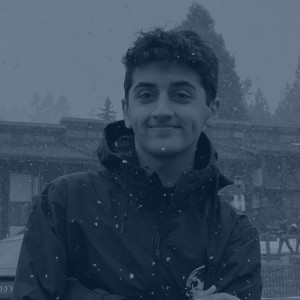Patrick Riley, 21

After joining the Bishop Ireton High School Coding Club in 2015, on advice from Major League Hacking (MLH) Coach Peter Murphy, Patrick Riley competed in the club’s small-scale hackathon that winter. He has now been actively involved in the hacker community for seven years. Discovering a passion for technology early in childhood, he enjoyed tinkering with his family computer and learning about how software programs work. Patrick says “technology has given me not only a career, but also an avenue to give back to my community in an area that is desperately needed today. I hope to continue to learn and give back throughout the rest of my college career and for the rest of my life.”
Using languages like Lua, Python, and JavaScript to create a mobile game at that first hackathon was “an awesome experience,” Patrick says, “and it was so cool to see what I was able to create in just twelve short hours.” Wanting to attend a larger scale hackathon, Patrick and a few friends registered for HackTJ. While the simple game his team built didn’t win, Patrick “was able to see how impactful hackathons could be at bringing computer science to students of all backgrounds.” Inspired to host a hackathon at his own high school, Patrick teamed up with friends to organize HackBI, Bishop Ireton’s first-ever hackathon.
The process of organizing a hackathon gave Patrick the opportunity to work with sponsors, plan workshops, handle logistical issues, and coordinate judging for the hackathon. Patrick believes “seeing the hackathon experience from both sides confirmed just how beneficial hackathons are to everyone involved,” and says the experience led him to become even more involved with the hacker community. Through these early organizing experiences, Patrick was prepared to face the challenge of stewarding VTHacks through the COVID-19 pandemic, transitioning the event from in-person to a virtual format and back again.
The hacker community has had a massive influence on Patrick’s professional career. “My current job as a software engineer is directly due to my involvement in HackBI, and my recent admission to graduate school is also reflective of my work with VTHacks,” Patrick says. Always wanting to share the hackathon experience with others, he looked for ways to help his events grow in attendance and scope. When he organized HackBI, Patrick was able to help increase attendance by 160%, and secure increased funding from companies and school administrators. At VTHacks, Patrick continued to grow the reach of hackathons, this time in more directed ways.
Inspired by Virginia Tech’s mission of Ut Prosim (that I may serve) and events like HackViolet, Patrick decided to focus much of the outreach for VTHacks on first-time hackers and non-CS students, demographics Patrick says are “often neglected when reaching out to communities for hackathons.” Working directly with other student organizations, as well as academic advisors for both STEM and non-STEM majors, Patrick intends to make the hackathon experience an even more inclusive one.
For all this, Patrick says, “I have been helping [to] organize hackathons for nearly a third of my life, and have helped provide over a thousand students with a hackathon experience that I hope impacted them as much as it has me.”
Quick Facts

Patrick Riley, 21

After joining the Bishop Ireton High School Coding Club in 2015, on advice from Major League Hacking (MLH) Coach Peter Murphy, Patrick Riley competed in the club’s small-scale hackathon that winter. He has now been actively involved in the hacker community for seven years. Discovering a passion for technology early in childhood, he enjoyed tinkering with his family computer and learning about how software programs work. Patrick says “technology has given me not only a career, but also an avenue to give back to my community in an area that is desperately needed today. I hope to continue to learn and give back throughout the rest of my college career and for the rest of my life.”
Using languages like Lua, Python, and JavaScript to create a mobile game at that first hackathon was “an awesome experience,” Patrick says, “and it was so cool to see what I was able to create in just twelve short hours.” Wanting to attend a larger scale hackathon, Patrick and a few friends registered for HackTJ. While the simple game his team built didn’t win, Patrick “was able to see how impactful hackathons could be at bringing computer science to students of all backgrounds.” Inspired to host a hackathon at his own high school, Patrick teamed up with friends to organize HackBI, Bishop Ireton’s first-ever hackathon.
The process of organizing a hackathon gave Patrick the opportunity to work with sponsors, plan workshops, handle logistical issues, and coordinate judging for the hackathon. Patrick believes “seeing the hackathon experience from both sides confirmed just how beneficial hackathons are to everyone involved,” and says the experience led him to become even more involved with the hacker community. Through these early organizing experiences, Patrick was prepared to face the challenge of stewarding VTHacks through the COVID-19 pandemic, transitioning the event from in-person to a virtual format and back again.
The hacker community has had a massive influence on Patrick’s professional career. “My current job as a software engineer is directly due to my involvement in HackBI, and my recent admission to graduate school is also reflective of my work with VTHacks,” Patrick says. Always wanting to share the hackathon experience with others, he looked for ways to help his events grow in attendance and scope. When he organized HackBI, Patrick was able to help increase attendance by 160%, and secure increased funding from companies and school administrators. At VTHacks, Patrick continued to grow the reach of hackathons, this time in more directed ways.
Inspired by Virginia Tech’s mission of Ut Prosim (that I may serve) and events like HackViolet, Patrick decided to focus much of the outreach for VTHacks on first-time hackers and non-CS students, demographics Patrick says are “often neglected when reaching out to communities for hackathons.” Working directly with other student organizations, as well as academic advisors for both STEM and non-STEM majors, Patrick intends to make the hackathon experience an even more inclusive one.
For all this, Patrick says, “I have been helping [to] organize hackathons for nearly a third of my life, and have helped provide over a thousand students with a hackathon experience that I hope impacted them as much as it has me.”
Quick Facts




